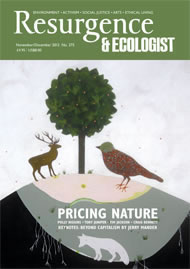There were very few butterflies around last summer. Although I saw plenty of meadow browns, they’re dull and nowhere near as exciting as many other species, which have been absent. I feel this physically and emotionally; it has affected my wellbeing so I think I deserve compensation. If I compare my feelings about the loss of butterflies to an injury I sustained in a traffic accident, I’d say it’s worth about £1,500. No butterflies = a pain in the neck.
Water, air, food, aesthetic quality, wildlife: the ecosystem does indeed provide me and everyone else with services we value greatly, and I appreciate they carry a cost. There are many academics and institutions working on what the environmental journalist George Monbiot described in a recent article for The Guardian as “natural capital”, “ecosystem services”, “green infrastructure”, and biodiversity and habitat “asset classes” within an “ecosystem market”. There are people working on toolkits to identify and describe ecosystem services. Thus they are creating markets from methods of valuation for these things, and economic instruments through which ecosystems can be both exploited and protected through pricing.
My problem is that my willingness to accept the market approach is coloured by the opinion that it’s stupid, irresponsible nonsense.
The neo-liberal takeover of environmentalism is not a paradigm but a confidence trick, perpetrated by market forces and supported by complicit environmentalists more interested in corporate goals than in anything as antiquated as Nature. As such, it will crumble if enough pressure is applied by those prepared to articulate intrinsic value in Nature and the kind of care that stands up as advocate, rather than stands in as manager.
This requires a cultural project that explores value, not price, and socio-economic alternatives to the market-driven commodification of Nature: a job for the truth and reconciliation process that emerges from the joining of Resurgence with the Ecologist. If environmentalism can be said to have soul, this is where we fight for it.
It’s hard to pinpoint the time when markets bought the environment. Perhaps it happened through a manipulation of language and ideas during the ‘green bubble’ of the late 1980s and early 1990s. A public awareness of environmental issues within a burgeoning market-driven politics and a desire amongst environmentalists to become a professional class with an identity makeover fuelled a green movement eager to work with anyone to achieve common goals.
When the bubble burst, that space was flooded by climate-change anxiety; its landscape littered with confused and badly articulated notions around sustainability, biodiversity and natural capital; its principles swept aside by a naive pragmatism, which became a kind of ideology that supported market intervention and a funding-obsessed managerial culture. Like many people involved at the time, I have to shoulder some responsibility for this.
Language is crucial in linking experience of Nature with both a fear of it and a fear for it. So much biodiversity conservation is concerned with protecting the Nature we like from the Nature we don’t like. This resource conservation is Nature management for humans, and perhaps a consequence of ecology’s use of the language of economics to interpret natural processes – competition, energy expenditure, strategy, and so on. This view of the world allowed a business model to get a toehold from which it largely took over. But if this has slipped way down the political greasy pole of priorities, then other forms of conservation with an Arcadian tendency and an antipathy to market forces and corporate structures are almost unheard of today. I want to join with others to change this.
The opportunity to reinvigorate the environmental movement following the financial crisis appears closed off by the headless running around of governments, institutions and organisations desperate to conserve a threatened reality. Those of us who want something else must find the courage to stand up for Nature with a language that refuses business-speak and instead articulates ideas that grow from intimate experience of Nature.
I lied about the butterflies. Although I do feel the absence of many butterflies, I don’t really think meadow browns are dull and of less importance. I think they’re dark and underworldly and that they inhabit those priceless, seedier places of late summer and I take heart from them as I take heart from being able to write this here and now.








